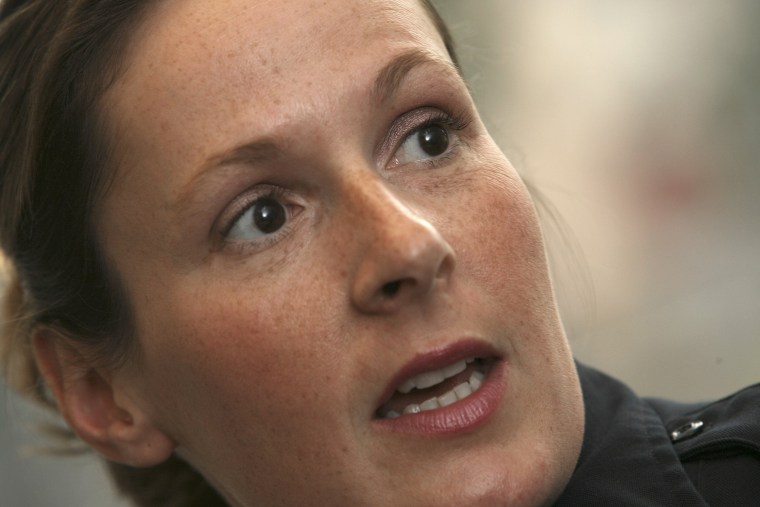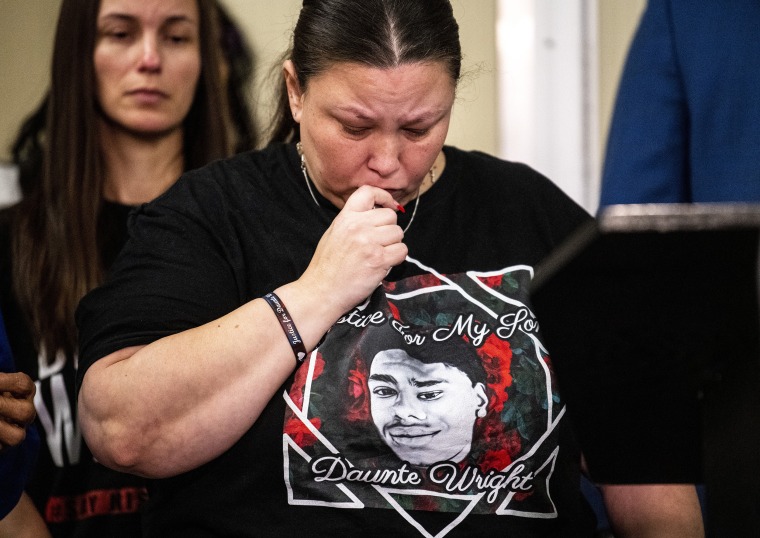MINNEAPOLIS — The former suburban Minneapolis police officer accused of fatally shooting Daunte Wright, a Black motorist, when she confused her handgun for her Taser during a traffic stop, according to her department, will testify at her trial, her attorney revealed Tuesday as jury selection got underway.
The lawyer, Paul Engh, disclosed the decision to have the former officer, Kim Potter, take the stand after a potential juror wrote in her questionnaire that she didn't fully understand how the fatal encounter came about.
"Let me tell you that if you're selected, Officer Potter will testify and tell you what she remembered what happened," Engh said.
"So you will know, not just from the video but from the officers at the scene and Officer Potter herself, what was occurring," he said. "I think it should quite interesting in hearing what she has to say."

Potter, a 26-year veteran of the Brooklyn Center Police Department, was charged with first- and second-degree manslaughter in the death of Wright in April.
The Hennepin County Medical Examiner's Office said Wright, 20, died of a gunshot wound to the chest.
According to the complaint against Potter, Wright was initially stopped on the afternoon of April 11 for an air freshener hanging from his rearview mirror and the car's expired license plate tabs. Officers then learned that Wright also had an arrest warrant for a weapons violation.
A body-worn camera showed that after he was ordered out of the car and officers tried to handcuff him, Wright tried to get back in the vehicle as a female voice shouted, "Taser!"
The same voice could be heard later saying, "Holy s--- I just shot him," as Wright tried to drive away, police said.
Tim Gannon, the Brooklyn Center police chief at the time, said he believed Potter meant to draw her Taser but instead grabbed her service weapon.
Potter, who is white, has said she made an innocent mistake when she shot Wright. She and Gannon resigned in the wake of the shooting.
Minnesota Attorney General Keith Ellison announced in May that his office would lead the prosecution. His office also oversaw the prosecution that led to the murder conviction of former Minneapolis police officer Derek Chauvin in the killing of George Floyd.
Wright died as Chauvin's trial was underway and tensions were high in the Twin Cities. His death sparked several nights of protests in Brooklyn Center and revived painful memories of the sometimes violent unrest that erupted after Floyd died in May 2020.

The prospective jurors summoned Tuesday had already responded to questionnaires similar to those used in Chauvin's murder trial. About 200 people were asked what they knew about the Potter case, their impressions of her and Wright and their views on protests and policing in the Minneapolis area in recent years.
The first juror to be seated Tuesday, a man who said he is a medical editor, said he has a very unfavorable view of the "blue lives matter" slogan that has emerged in recent years. He said he believes it is less about supporting police than about countering the Black Lives Matter movement. But he also said he opposes the movement to abolish or "defund" the police.
Two other jurors — a retired special education teacher and an operations manager at Target — were also selected Tuesday.
Jurors' names were being withheld and weren't shown on the livestream transmission of the trial, a rarity in Minnesota. Hennepin County District Judge Regina Chu set aside six days for jury selection, with opening statements scheduled for Dec. 8.
California civil rights lawyer John Burris, who won a $2.8 million settlement for the family of Oscar Grant, a Black man killed in Oakland by a transit officer who went to prison for grabbing his gun instead of a Taser in 2009, said he thinks Potter had the right to use reasonable force and could get credit from the jury for intending to use her Taser. And if that happens, he said, the best the prosecution might get is a conviction on the lesser charge. But if the jurors agrees that she shouldn’t have used her Taser at all, he said, they might find it was first-degree manslaughter.
Still, if Potter comes across as remorseful, she will get empathy that could result in an acquittal or a hung jury, Burris said.
"These are tough cases," he said. "A lot of emotion comes in a case like that. If an officer did not intend to kill someone, that officer is going to be highly emotional. That emotion is going to have an impact on jurors."
Shaquille Brewster reported from Minneapolis and Erik Ortiz from New York.

